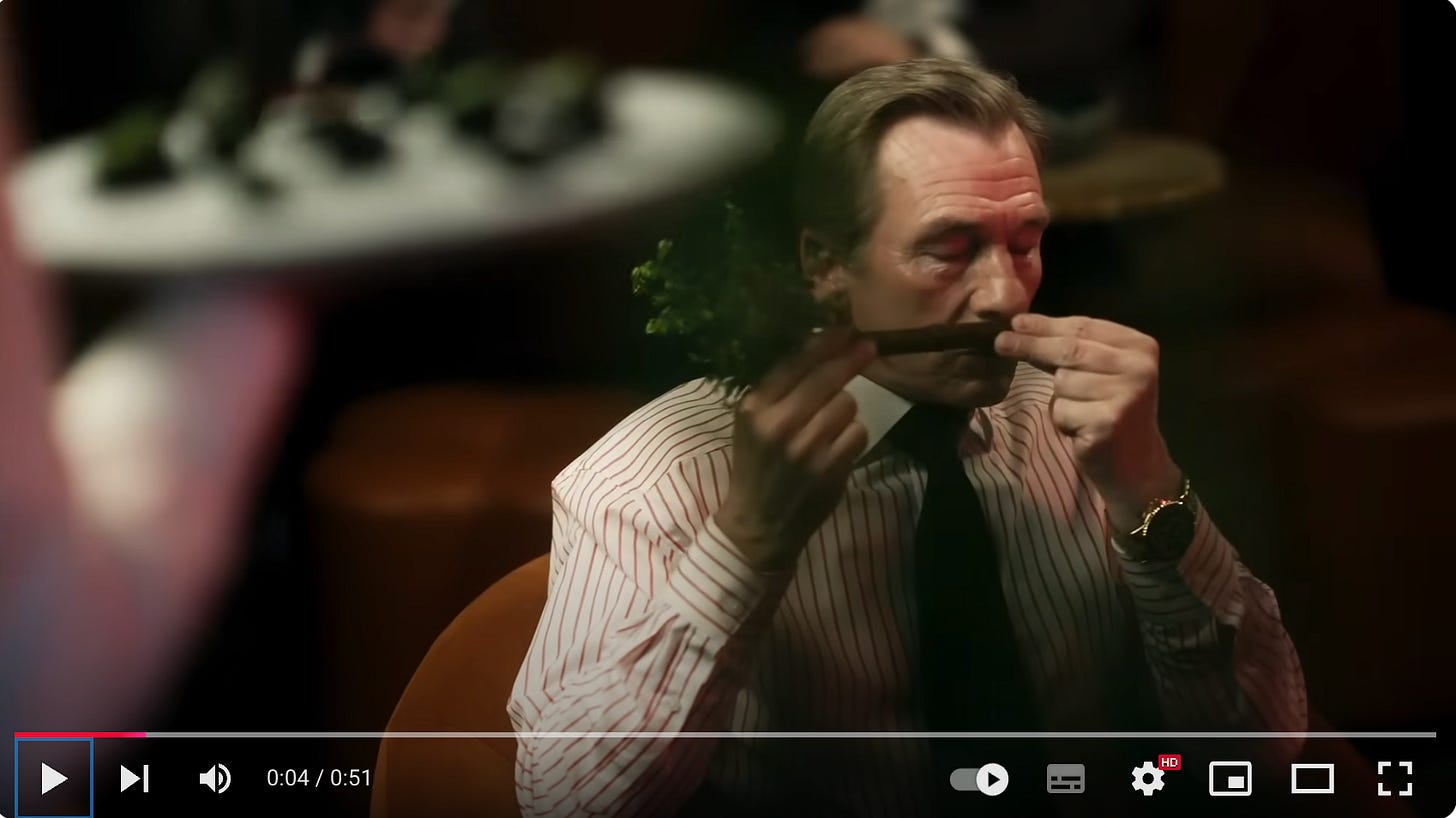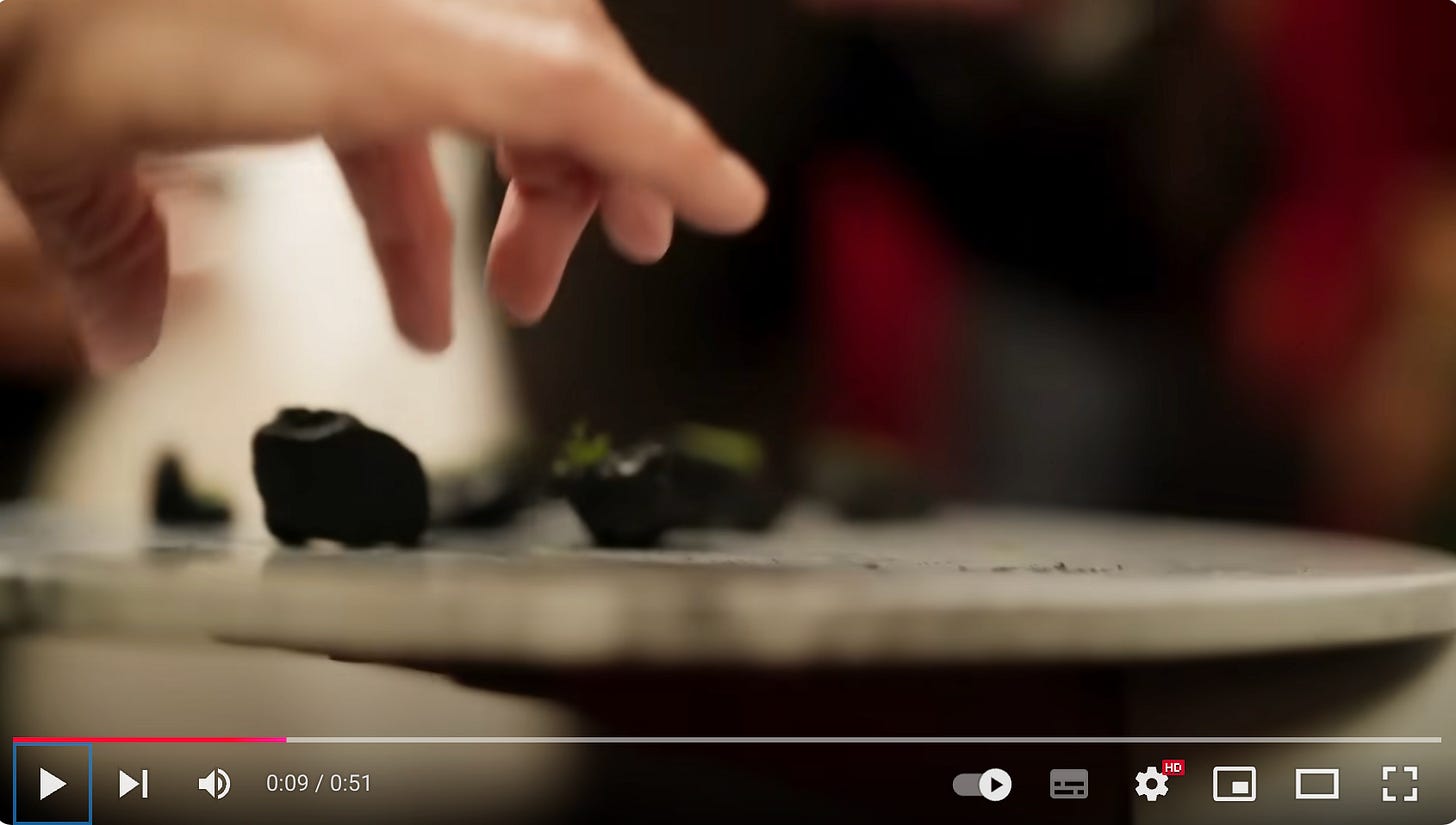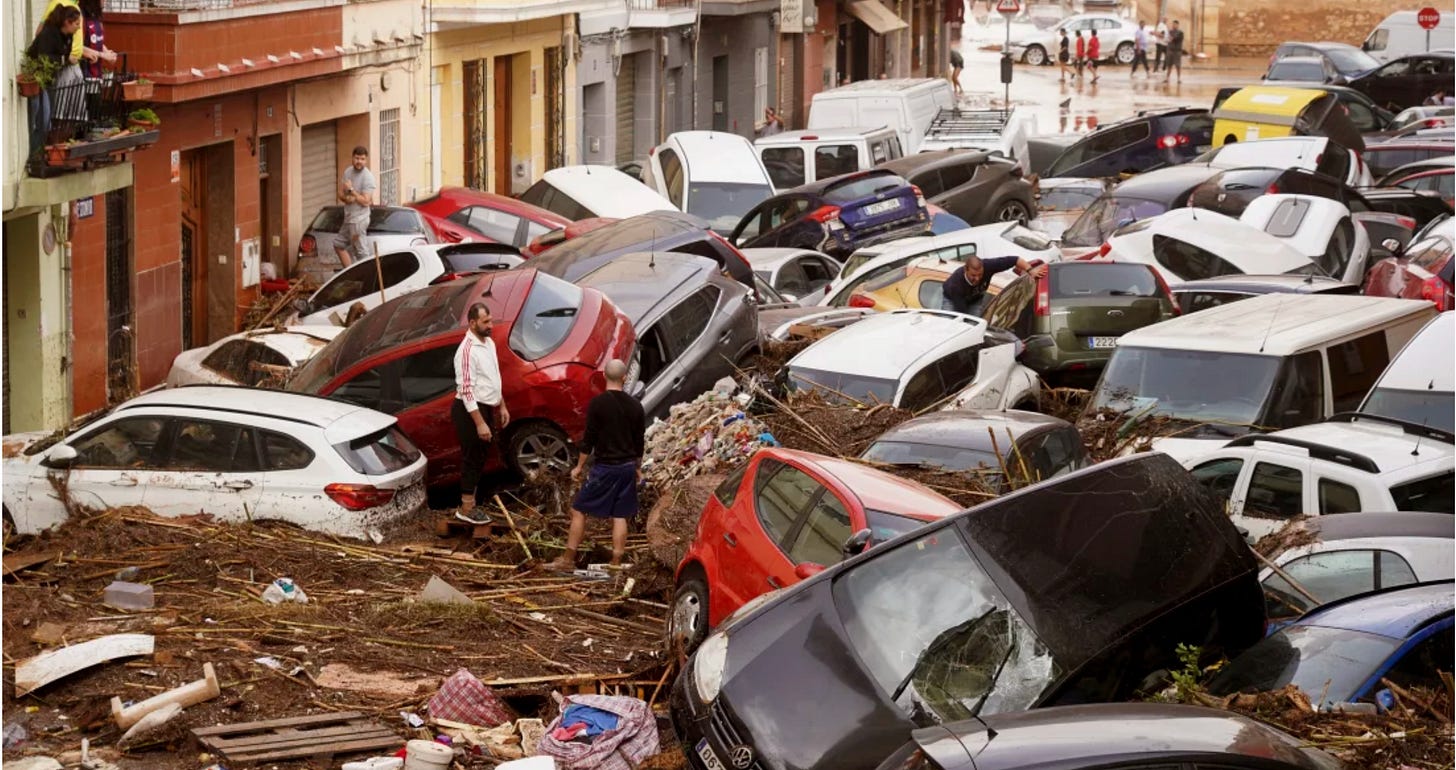Apocalypse, rubble, riches and a new Oxfam Advert
This blog starts as a critique of Oxfam's latest (great) climate ad, but then hard pivots to Joe Rogan, the right's apocalyptic nihilism and Naomi Klein. Hang in there!
Oxfam have released a 50 second advert “Make Rich Polluters Pay” about the wealthy and their role in driving the climate crisis.
In the wake of the disastrous US Presidential election the ad lands at an important time. You can watch the ad here. I also want to talk about what this ad does that works so well.
What this ad does right:
1 - It names an “enemy” by evoking feelings of revulsion
The objective of the ad is it to create an enemy, to blame the wealthy for the destruction of our planet. It does so by evoking feelings of “revulsion” at them for their slovenly behaviours as the climate collapses.
In our present world, to attack “wealth” or “wealth inequality” per se is to cut off ordinary people from their best shot at financial security, it is a losing tactic. The ad gets around this by caricaturing its enemy: the vulgar ultra wealthy.
2 - Substitution: it uses a range of ridiculous pictorial substitutions (metaphor)
The advert is full of absurd and hyperbolic visual substitutions. A glass of oil is substituted for wine. The substitutions are hyperbolic because oil can never literally be wine and we all know this.
(Note how booze is also a "poison". As in asking a friend what they’d like to drink: "what's your poison?")
A jerry can is substituted for a magnum of Champagne
A twig for a cigar .
Coal for truffles
Substitution (the act of one thing being substituted for another) has the effect of:
destabilising our understanding; before
Inviting us to reconstitute our understanding through decoding the meaning of the substitution.
This is how metaphor works, a successful metaphor gives the audience a buzz, if they work out what it means. A seminal piece on rhetoric in advertising by Macquarie and Quick sums it up as an:
“aesthetic reward from successfully processing a deviant text.”
It’s the agency of decoding the underlying message (being “in on it”) that gives these acts of substitution their power.
3 - Substitution? Or Trans-substantiation? Also Apocalypse
Oil into wine, blood into wine, the body into bread, the act of substitution is deeply wired in western minds and culture.
If you were raised a Catholic you will be intimately familiar with the Eucharist, that sacredly insane moment in Mass when we are asked to witness Jesus’ body and blood being transformed into bread and wine.
Well the same trope is at play in the Oxfam ad, though with none of the humourless moralism of a Catholic Mass.
Whether the ad’s religious undertones are intentional is irrelevant because the ironic power of the trope derives from the cognitive freedom it gives us to be free - ironically - to come to our own conclusions about the story we are being told, about the message that’s being conveyed.
That said, the choice of operatic music underpinning the ad - the “Flower Duet” from the opera Lakme - is surely significant?
So I did some “researching”
Did you know “Lakme” is French for Lakshmi?
And that Lakshmi is the Hindu Goddess of Wealth?
So it must be true? Right? But even if it isn’t, I’m entitled to my opinion and - as everyone knows - opinions are the new facts.
Substitution Part 2: War or Climate Change?
I recently listened to a podcast with Naomi Klein (“No Logo”?), you should listen too. Though I warn you now, it is not an easy listen, but it is an urgent and important one.
In it, Naomi talks about a real world type of substitution in which the multiple crises of geopolitical instability and climate change have become suffused and interchangeable:
“Some of the images from the covers of newspapers this past week where you see images of massive flooding whether it's here in the US or in Nepal and then you see the rubble in Lebanon and it's just… sometimes you can't tell whether you're looking at a climate disaster or a military strike.”
Naomi is a rare left voice who is able to draw links between our apocalyptic culture and its nihilistic right wing politics. Naomi’s genius is in her ability to draw evocative parallels between the destruction of an extreme weather event and an air strike. We have crossed a line in which the so-called polycrisis of war, climate collapse and inequality have melded into one.
Left and right visions of the future
A tipping point of another kind was reached in the US Presidential election: it was the moment when despite the Democrat’s domination of the mass media (CNN, New York Times), Trump dominated the digital. In the wake of the election it’s become commonplace to hear critiques arguing that that the left needs its own version of the right’s digital ecology of “brocasters”.
But a big problem with this is the right’s increasingly nihilistic and apocalyptic midset. In the way groups like Q-Anon and elements of MAGA use survival-of-the-fittest narratives to lean into or “swim along with the tide” of the crises of inequality, fentanyl, climate collapse, war.
The right’s preppy podcasters like Joe Rogan have built political audiences (without setting out to be political podcasters) around right coded themes of survivalism, apocalypse and rugged male individualism, amidst apocalypse.
In stark contrast to the hectoring of CNN or a Laura Kuenssberg, Rogan’s gentle and sometimes hours long content veers between awe inspired (yet credible) chats about extraterrestrial life with centrists like Professor Brian Cox. To covid denialism, guns, UFC and bear hunting.
But Rogan is only mirroring something in our culture that accelerated after the Global Financial Crisis of 2008/10, in lieu of a politics equal to the problems laid bare by the collapse of our economies. Our popular culture that became suffused with apocalyptic substitutions.
It’s there in the popularity of zombie stories like The Walking Dead (premier: 31 October 2010) or soothing ASMR videos of men doing bushcraft (the better to cure the insomnia of anxious, sleepless men) or in TV shows like Survivor or Outlast.
I recently watched a reels video of kids flying drones aerobatically around disused industrial sites. The skill and speed and accuracy of the “pilots” was unnerving. I scrolled on. Next up was footage of MPs in parliament sitting in stony silence as they heard testimony about Israeli Army drones shooting children in Gaza. The MPs were visibly shocked. But their calls for more aid for the children was another kind of political substitution. A substitute for demanding trials for genocide.
There is no one who's going to save us, but us.
People like Joe Rogan have made up their mind: we are all going to hell in a handcart, so best prepare you and yours for when TSHTF.
But we can’t rely on Rogan, and he can’t rely on the aliens, or the survivalists. And none of us - not even Elon Musk’s own children - can rely on tech billionaires with their fantasies about colonising Mars. They aren’t going to save us.
Naomi’s counterpoint to the nihilism of the right is this:
“there is no-one who’s going to save us… but us.”
It doesn’t seem like much, but it is something, and we are organising in the rubble, we have to take whatever scraps we can. As Naomi points out, there are no guarantees and it might be time to give up on the idea of a final moment or happy ending.
We need to organise amidst the rubble, but rather than just copying Joe Rogan, perhaps we also need to be looking at Steve Bannon, because he’s sure been studying us.
Klein adds:
"Instead of happy endings maybe what we need to take from studying [Steve] Bannon the way he's been studying us, is that we need a War Room to strategise, not for an
exclusive reactionary national movement, but for an inclusive liberatory movement. Obviously world building and utopian thinking can be helpful as a north star but what we need is strategy we definitely need strategy.
"When we talk about the scale of these crises if you think you have to deal with it as an
individual you would immediately throw up your hands and give up... strategy means saying: 'okay you're going to do your thing and I'm going to do my thing and this is where these things fit together into a coherent vision of how we together are going to get from here to there,' right?
“I have to be suspicious of anybody including people on our “own side” who holds out this idea of a kind of a moment where everything is going to be okay. Like, if that was ever true we have missed that moment and so the future that we need to build - they have to be honest enough that they admit - that we are organizing in rubble
“Who we want to be in these very difficult futures like how we want to treat each other
whether everybody's going to be allowed to see themselves in that future the extent to
which we place a cherishing of life at the centre, the extent to which we prioritize joy
and art in that future like we have a lot of choices to make and there can be a
beautiful future, but I don't think it is a moment, it's a practice. We're going to have to practice it together we're going to have to remind ourselves every day that that's how we're choosing to live.”









